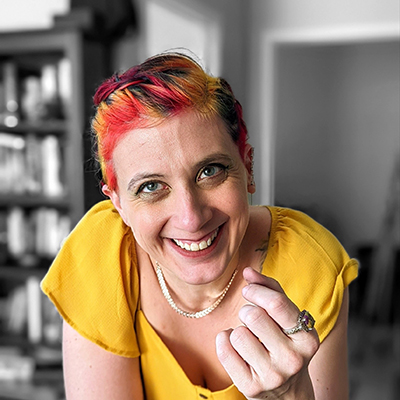At CHPW, we know how important it is to listen to our members and the communities we serve.
But listening starts when we have the right CHPW team member in the right role who has a deep understanding of the perspectives and experiences of those we serve. Meet Manda, one of our case managers whose role includes leading our care of our members who identify as part of the LGBTQIA+ (Lesbian, Gay, Bisexual, Transgender, Queer, Intersex and Asexual) community. We asked Manda five questions about what her role means and how she is helping CHPW in supporting LGBTQIA+ communities. Here are her answers:

I recently became CHPW’s first lead on working with our LGBTQIA+ members within our care management team. So, I have two roles at CHPW; I am a Field Case Manager that works on behalf of our Apple Health (Medicaid) members to collaborate on their care and advocate as needed to help them with providers and other health needs. And then, I work with a wide range of our LGBTQIA+ identifying members to help them navigate the health care system and I consult with our CHPW team on how we can better serve our members who identify as LGBTQIA+.
I have a lot of experience through community volunteering where I helped train organizations on how to fight for LGBTQIA+ rights and have more inclusive and equitable practices. For the last two years I have been feeling a strong draw to get back into this work, so I was excited when our department looked to have someone take on being a resource lead. I have already been able to represent CHPW at health industry Town Halls and at a work group with the Washington Health Care Authority to develop state-wide recommendations to better serve this community and improve health outcomes.


June is Pride Month – a month that was born out of advocacy & protest against injustice but has become more of a celebration in recent years. What do you think is important about continuing to recognize Pride Month?
Being joyful and visible in this time of darkness shows the world that we are here, we have value, we matter, we are loved, we have great capacity for love, and we belong. We represent all walks of life and work in all professions. We want to live our lives to the fullest and not be hurt for just being born who we are. It is heavy to have to battle for our rights again and again. It is important to take the joy to give us hope.


How does LBGTQA+ identity affect health or someone’s healthcare?
Historically, LGBTQIA+ populations have worse health care outcomes. Many people in these communities have avoided health care all together due to incidents where they felt stigmatized, bias and/or were misgendered by a health care professional. This can impact their lifelong health because they will have missed out on preventive health screenings that could have identified cancer, heart disease along with many other treatable conditions. And the National Alliance on Mental Health has shared the increased risk of mental health conditions including suicide that are often tied to feelings of isolation or trauma.
COVID-19 brought additional stressor to LGBTQIA+ populations as well. Many are employed in essential jobs, more likely to live in cities where physical distancing is more difficult, be low income, have co-occurring conditions (like asthma, heart disease, hypertension) are more likely to smoke and have disabilities.


What message do you think is important to share with someone who may be hesitant to talk to their doctor or care provider about their being LGBTQA+?
Having a healthy and trusting provider relationship is very important. I encourage my members to ask when searching for a new provider if they have a doctor or care provider that is positive to the LGBTQIA+ community.
I also encourage my CHPW members to let me know if they have a bad experience. I can let CHPW know about the need for education for a doctor, staff, or clinic in caring for LGBTQIA+ population


In Washington state & for those on Apple Health (Medicaid), what health care is covered for LGBTQA+ patients?
LGBTQIA+ patients have access to all the same care our straight members do. CHPW provides coverage for gender affirming care such as primary care, hormone therapy, behavioral health services and more.

Learn more:
- Resources for our LGBTQ+ CHPW Members
- Mental health resources for LGBTQ populations
- What are pronouns and why do they matter?

